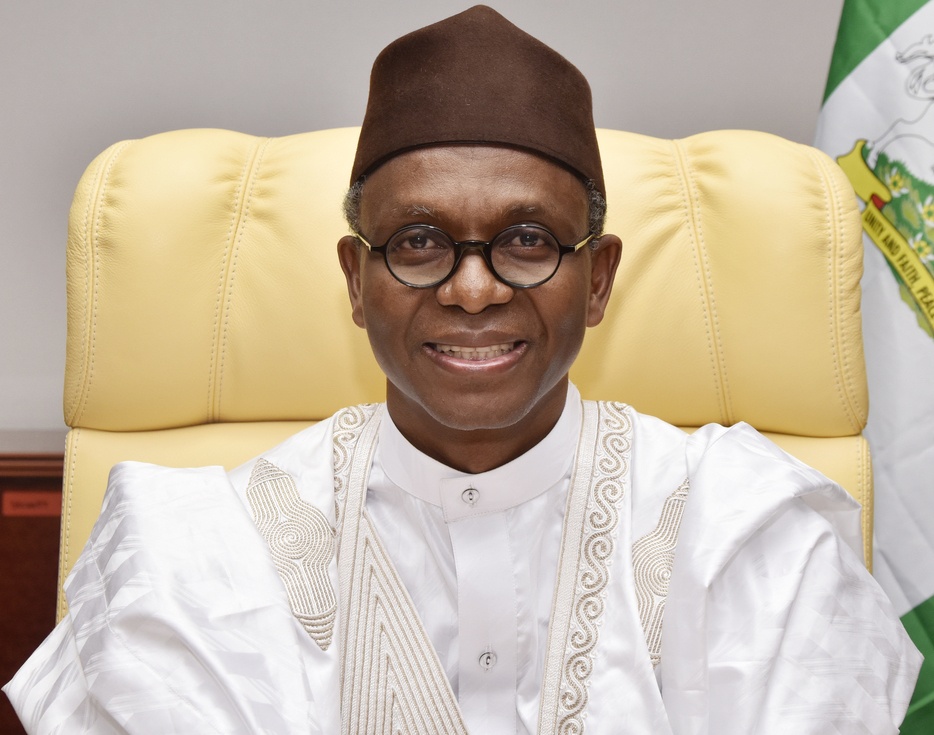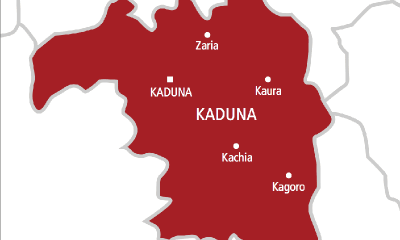Jobs/Appointments
Kaduna is Sacking Workers to Save Scarce Funds—El-Rufai

By Adedapo Adesanya
The Governor of Kaduna State, Mr Nasir El-Rufai, has explained the reason his administration is trimming the workforce of the state’s public service is due to the dwindling financial resources and higher wage bills which the government cannot be able to sustain, noting that the exercise will help the government to save scarce funds.
The Kaduna state government had on April 6 disengaged 4,000 local government workers and this development has raised dust, especially from the state chapter of the Nigeria Labour Congress (NLC).
The body kicked against the decision, calling on the state government to reverse the decision and seek alternative means of running its affairs without inflicting additional pains on the public.
In a statement signed by his spokesman, Mr Muyiwa Adekeye, Governor El-Rufai insisted that the government was not elected just to pay salaries of public servants alone, but to also develop the state by building schools, hospitals, upgrading infrastructure and making the state more secure and attractive to the private sector for jobs and investments.
Mr El-Rufai pointed out that what it has been receiving from the federal allocation committee since the middle of 2020, like most other sub-nationals, can barely pay salaries and overheads, adding that in the last six months, personnel costs have accounted for between 84.97 per cent and 96.63 per cent of Federation Account Allocation Communication (FAAC) transfers received by the Kaduna State Government.
“In November 2020, KDSG had only N162.9 million left after paying salaries. That month, Kaduna State got N4.83 billion from FAAC and paid N4.66 billion as wages. In March 2021, Kaduna State had only N321 million left after settling personnel costs,” a part of the statement read.
The statement pointed out that “last month, the state got N4.819 billion from FAAC and paid out N4.498 billion, representing 93 per cent of the money received.
‘’This does not include standing orders for overheads, funding security operations, running costs of schools and hospitals, and other overhead costs that the state has to bear for the machinery of government to run, for which the state government taps into IGR earnings.”
The Kaduna State Government said it believes that the overall wages of the public sector are still relatively low, noting that the current levels were obviously limited by the resources available to the government.
The government further argued that the public service of the state with less than 100,000 employees (and their families) cannot be consuming more than 90 per cent of government resources, with little left to positively impact the lives of the more than 9 million that are not political appointees or civil servants, adding that it is gross injustice for such a micro-minority to consume the majority of the resources of the state.
In addition, it pointed out that the measures which the government took to cope with the COVID-19 pandemic have shown clearly that the public service requires much fewer persons than it currently employs.
The statement recalled that “in September 2019, Kaduna State Government became the first government in the country to pay the new minimum wage and consequential adjustments. The state government followed this up by increasing the minimum pension of persons on the defined benefits scheme to N30,000 monthly.
“This step to advance the welfare of workers significantly increased the wage burden of the state government and immediately sapped up the funds of many local governments.”
According to the state government, “what each public servant earns might be puny in comparison to private-sector wages, but the total wage bill consumes much of the revenues of the state.
‘’Therefore, the state government has no choice but to shed some weight and reduce the size of the public service. It is a painful but necessary step to take, for the sake of the majority of the people of this state.”
While justifying the job cut, the statement, however, described it “as a painful but necessary step to take, for the sake of the majority of the people of this state.”
The Governor further said that the rationalisation exercise will also affect political appointees, stating that its purpose is to save funds and ensure that a strong and efficient public service exists to use those resources to implement progressive programmes and projects for the people, and thereby develop the state.
‘’The public service is an important institution, and it should therefore maintain only an optimum size.
“Faced with a difficult situation, the Kaduna State Government is persuaded that it cannot refuse to act or act in ways that only conduce to populist sentiment, without solving the fundamental problem,” he said.
Jobs/Appointments
NMDPRA Denies Fake Employment Alert, Warns Unsuspecting Job Seekers

By Adedapo Adesanya
The Nigerian Midstream and Downstream Petroleum Regulatory Authority (NMDPRA) has clarified that the viral report suggesting that it is currently employing new staff is the “handiwork of fake recruitment syndicates established to mastermind fraudulent activities.”
In a Monday statement posted on its official X handle, NMDPRA expressed that it was compelled to publish the disclaimer to alert the public against such activities due to what it described as “exploiting young economically vulnerable and unsuspecting Nigerians perhaps into parting with huge sums of money for purported employment opportunities into the authority.”
“They do this by issuing bogus “Letters of Employment” and empty promises, as well as offering non-existent positions. These may well be the handiwork of fake recruitment syndicates established to mastermind these fraudulent activities.
“We wish to use this opportunity to state categorically that the NMDPRA is NOT conducting any recruitment exercise currently. Neither is the Agency undertaking any kind of employment in its services at any level. For the avoidance of doubt, any future recruitment exercise would be undertaken in accordance with extant rules guiding such exercises in the Nigerian Public Service,” the organisation emphasised.
The agency further advised the public to disregard these fake employment advertisements and urged them to visit its official website and social media pages to verify any recruitment claims.
The statement added, “In this regard therefore, we would like to advise the public and all Nigerians to ignore these spurious claims by unscrupulous people whose only objective is to defraud Nigerians and cast aspersion on the authority.
“We further advise that for current and up to date information regarding all our activities, kindly refer to our official corporate website: www.nmdpra.gov.ng as well as all our verified online social media outlets (i.e. Facebook, Linkedln and Instagram) for authentic information.”
Jobs/Appointments
Aradel Appoints Nnoli Akpedeye as Independent Non-Executive Director

By Adedapo Adesanya
Aradel Holdings Plc has appointed Ms Nnoli Akpedeye as an Independent Non-Executive Director, effective February 2, 2026, following a resolution passed at the company’s board meeting held on January 28, 2026.
In a notice to shareholders, Nigerian Exchange (NGX) Limited, and the investing public, the company disclosed that the appointment is subject to ratification by shareholders at its next Annual General Meeting (AGM). The board also authorised the Company Secretary, Mrs Titiola Omisore, to notify relevant regulators and take all necessary steps to give effect to the decision.
Ms Akpedeye brings more than 36 years of multi-disciplinary experience spanning oil and gas, engineering, legal and arbitration services, and management consulting. Her career reflects a strong blend of technical expertise and strategic leadership, with competencies in management and strategy, business process engineering, organisational development and change management, as well as entrepreneurship development.
Until 2014, she served as Technical Planning Manager for Shell Exploration and Production Companies in Nigeria, where she led the execution of high-impact, mission-critical projects. Over the course of her career at Shell, she held roles across civil engineering design, planning and construction, project management, facility management, technical audit, and business planning and strategy, gaining extensive local and international exposure.
Beyond her corporate career, Ms Akpedeye is an entrepreneur and advocate for capacity building in engineering and energy. She runs Contego Servo Limited and Perfectus Laundi Limited, and in 2013, she launched the “Introduce a Girl to Engineering” programme aimed at encouraging secondary school girls in Nigeria to pursue careers in engineering and related STEM fields.
She is a Council for the Regulation of Engineering in Nigeria (COREN)-registered engineer, a Fellow of the Nigerian Society of Engineers (FNSE), and a past President of the Association of Professional Women Engineers of Nigeria (APWEN). She is also a founding member of the Women in Energy Network (WIEN) and serves as a passionate ambassador for science, technology, engineering and mathematics education.
In addition, Ms Akpedeye is the Chief Operating Officer (COO) of Compos Mentis Legal Practitioners and the Chairman of the Board of Trustees of the Compos Mentis Foundation.
Her appointment further strengthens Aradel Holdings’ board with deep industry knowledge, governance experience, and a strong track record in leadership and institutional development, as the company continues to pursue its strategic objectives within Nigeria’s energy landscape.
Jobs/Appointments
Geregu Power Chooses Sean Manley as Interim CEO

By Aduragbemi Omiyale
An interim chief executive has been appointed by Geregu Power Plc and he is Mr Sean Manley, with his appointment to take effect from Monday, February 2, 2026.
A statement from the power generating firm disclosed that his appointment is subject to the approval of the Nigerian Electricity Regulatory Commission (NERC) and the shareholders of the company at the next general meeting.
In the notice, the organisation expressed confidence that the appointee would use his wealth of experience and leadership to “add significant value to the company.”
Mr Manley is said to be “a seasoned power-sector professional with a proven track record in delivering complex energy projects in developing markets.”
He is armed with more than 30 years’ experience spanning sales, business development, project implementation, supply-chain management, and OEM-led delivery within the power sector.
Over the course of his career with Siemens, Mr Manley has developed deep technical and operational expertise in thermal power generation, covering plant construction, commissioning, major overhauls, and long-term operational support.
He is widely regarded as a practical problem-solver, with a demonstrated ability to close projects in challenging operating environments and brings extensive international experience and strong intercultural skills acquired across multi-jurisdictional engagements.
His areas of expertise include the delivery of large, complex infrastructure projects, management of multi-million-dollar business units, client and stakeholder relationship management, business and market development, as well as logistics and procurement analysis critical to successful project execution.
The appointment of Mr Manley comes after Mr Femi Otedola divested his stake in the energy firm last month to support the recapitalisation of First Bank of Nigeria, a subsidiary of FBN Holdings Plc, which he chairs.
-

 Feature/OPED6 years ago
Feature/OPED6 years agoDavos was Different this year
-
Travel/Tourism9 years ago
Lagos Seals Western Lodge Hotel In Ikorodu
-

 Showbiz3 years ago
Showbiz3 years agoEstranged Lover Releases Videos of Empress Njamah Bathing
-

 Banking8 years ago
Banking8 years agoSort Codes of GTBank Branches in Nigeria
-

 Economy3 years ago
Economy3 years agoSubsidy Removal: CNG at N130 Per Litre Cheaper Than Petrol—IPMAN
-

 Banking3 years ago
Banking3 years agoSort Codes of UBA Branches in Nigeria
-

 Banking3 years ago
Banking3 years agoFirst Bank Announces Planned Downtime
-

 Sports3 years ago
Sports3 years agoHighest Paid Nigerian Footballer – How Much Do Nigerian Footballers Earn
















